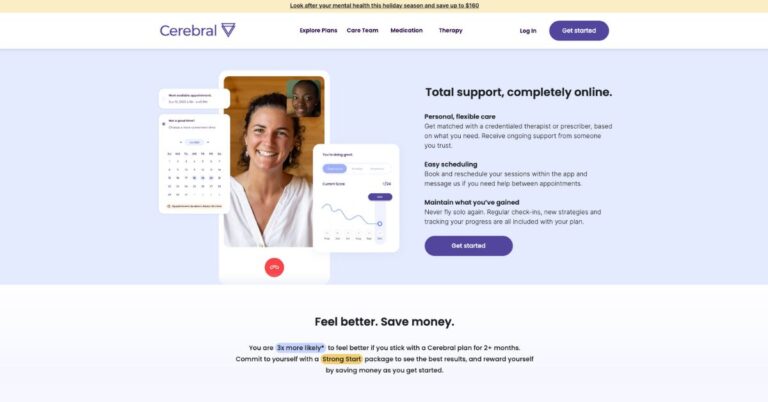MAPP, or Motivational Appraisal of Personal Potential, is one of the oldest online career assessments, dating back to 1995. It caters to anyone over 13, including students, graduates, mid-career professionals, or retirees, so I put it to the test to determine if it helps make informed career decisions. I’ll detail my experience from the registration process to reviewing my results, giving an honest overview of the test (and why you may want to consider other options).

Our Review Methodology
We meticulously evaluate each career assessment tool to ensure our recommendations are trustworthy and reliable. Our assessment is independent and rigorous, focusing on the following key areas.
We are committed to providing unbiased, thorough, and transparent reviews of career assessment services, turning your trust into actionable advice for your career journey.
MAPP Career Test Overview
The MAPP career assessment is a personalized test that’s supposed to help users discover their natural interests and motivations. It provides a comprehensive analysis of key personality traits in the Starter package, along with a few exploration resources, including a career database and a six-step planning guide.
Pros
- One of the earliest and most experienced career test brands
- Developed by psychologists
- Additional resources and packages available
Cons
- No personalized career recommendations with the Starter package
- Tedious and text-heavy report
- One of the more expensive career tests
Bottom Line: The MAPP career test has proven to be a valuable tool for decades. But even with a premium price, the report is underwhelming and doesn’t come with personalized career matches (unless you pay extra).
Why Did I Take the MAPP Assessment?
I feel lucky to have found a meaningful and self-fulfilling career as a writer, but I sometimes still wonder if I would be happier doing something else. Career tests marginally helped me throughout college, but I thought it was time to give them another try and see if I could gain new insights.
After searching for the best career tests, I came across MAPP and was impressed with its long track record. With over 8 million users worldwide, MAPP seems like a career test for anyone, regardless of age, language, location, or situation.
My Experience with the MAPP Assessment
MAPP has a simple website with only a couple of pages, so there’s not much else to do besides take the test. While it could use a refresh for better user experience and engagement, what matters is how the test works and what the results reveal.
Registration and Preparation
MAPP has a standard registration process at the beginning of the test. I had to enter my name, email address, and ZIP code, but I paid after I finished. MAPP also allows users to sign up using Facebook, Twitter, Windows, or Google. I didn’t find any pre-test guides or tutorials besides an FAQ page, which covers basic information and doesn’t lend much advice on how to prepare.
Test Procedure and User Interface
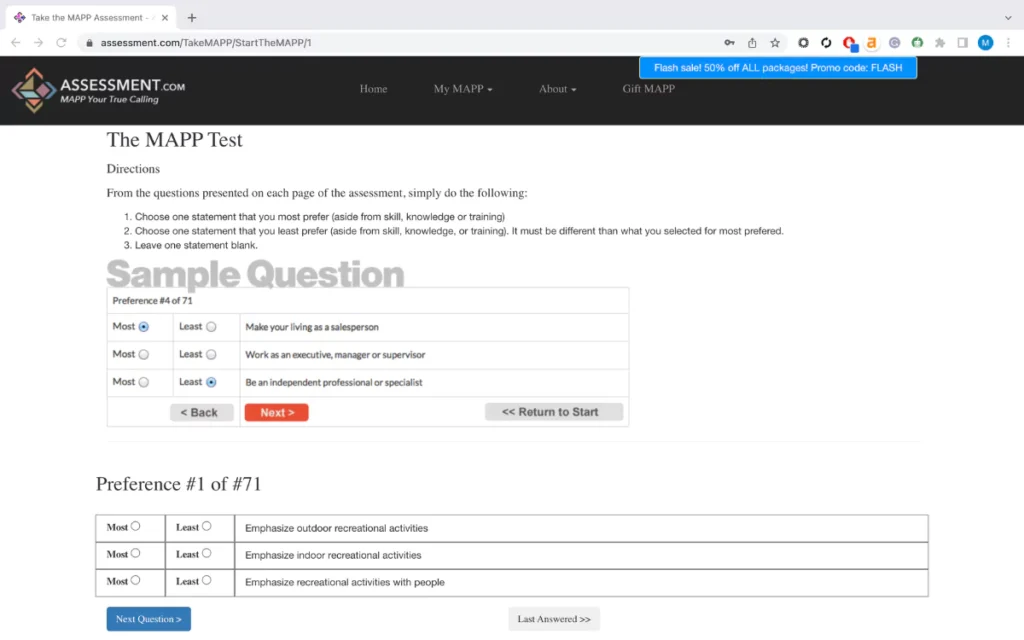
MAPP consists of 71 questions with a 22-minute estimated completion time. It took me about twenty-five minutes to complete the test, but there isn’t a time limit. I was also able to revisit previous questions and change my answers, but since only one question is presented at a time, it would take a while to click back to the beginning.
Nothing about the test is particularly interesting and engaging, but it’s easy to understand how to start and progress through the test. While I didn’t encounter any issues while taking the test, the user interface feels a bit outdated, with generic fonts, buttons, and a lack of visual elements.
Question Types and Clarity
The test only has preference-style questions, each presenting three options that must be categorized as most or least preferred, with the least preferable option left blank. Topics include:
- Job tasks
- Leisure activities
- Ideal living conditions
- Factors that affect career outlook
Some preference options seem entirely random, such as ranking between watching boxing matches and reading for children. All of them were clear, but some were hard to rank depending on the context.
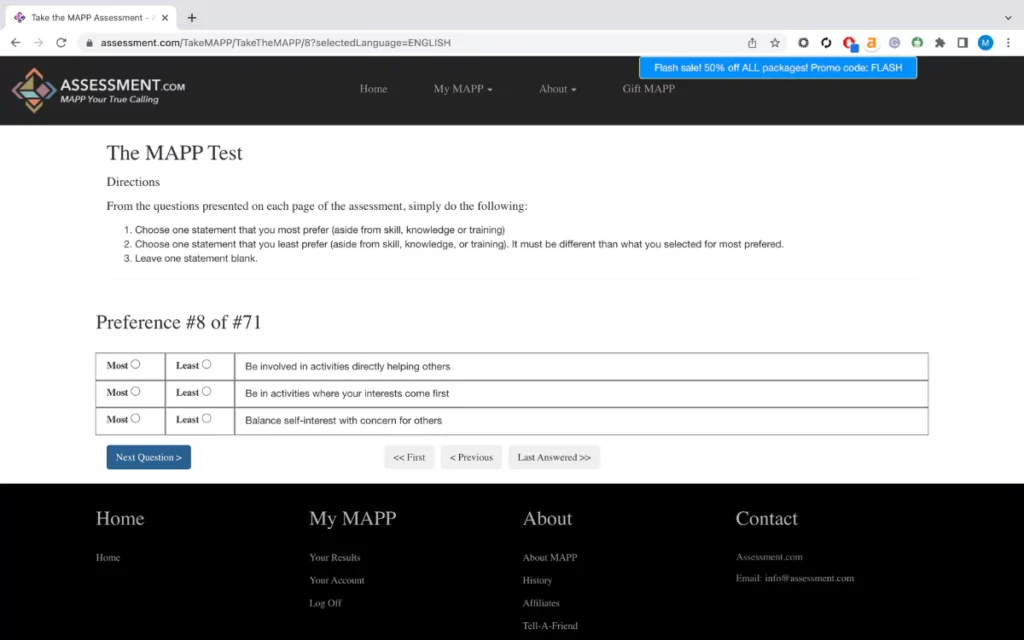
Privacy and Data Handling
MAPP doesn’t disclose any data handling policies on its website except in the privacy policy. MAPP claims it doesn’t reveal personal information to outside parties but doesn’t mention how they use personal data (and share it with their partners) or how long they hold it.
Customer Support
Besides a customer support email address (info@assessment.com), MAPP doesn’t have many customer support resources, including satisfaction policies and support availability. It needs clarity on how long it takes to get a response, but the website’s FAQ section addresses some common problems.
What Did My Results Reveal?
After taking the test, I received my basic report on the MAPP website. Most of it was behind a paywall, so I paid extra for the starter package. With a 50% promotion code, I only paid $44.98, but usually, this package costs about $90. Here are my overall impressions:
Report Delivery
After I entered my credit card information, I immediately received a web version of my results. I have yet to receive an email, and there’s no option to convert the report to a PDF. MAPP doesn’t mention how long my results will last, but I had to make an account at the beginning to come back to access it.
Presentation and Depth
At first glance, the starter report is a bit intimidating. It’s around 7,000 words, by my approximation, and most of the information comes in long blocks of text that make it dense and hard to digest immediately. It includes:
- Interest in job content
- Temperament for the job
- Aptitude for the job
- People
- Things
- Data
- Reasoning
- Mathematical capacity
- Language capacity
While these seem comprehensive, I had to dig to find pieces of relevant and usable advice. It lacks signposts and visual elements like graphs that convey information quickly, so I found it especially important to take notes and annotate where I found pieces of advice.
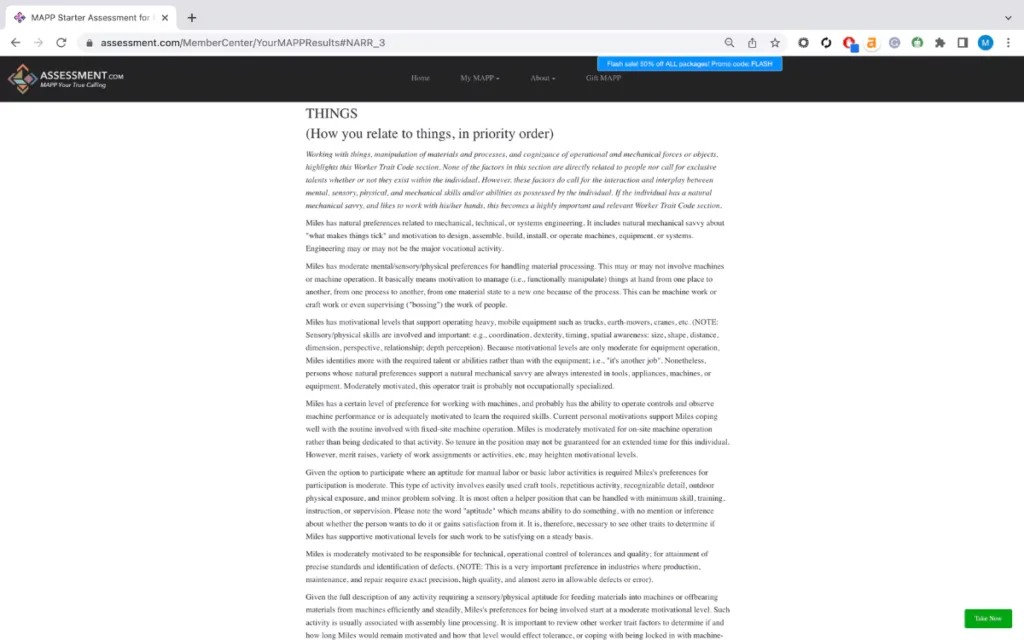
Likewise, several sections use abstract and ambiguous writing to convey messages. Take, for instance, this section under Aptitude for the job:
Sensory/mental awareness of “pieces of the picture” is capacity for comparative, intra-holistic recognition of parts relative to other parts and/or the big picture. It includes ability to see essential detail and make visual/mental comparison and discrimination relative to relationships of objects. The definition says “pieces of the picture,” so it recognizes the picture and its larger context, but this trait still emphasizes pieces and their status as pieces. Miles prefers to see the big picture by first putting all the “pieces” together. Most likely Miles already sees pieces as pieces rather than the big picture first and then breaking it apart into all the various pieces.
If you read that summary and had trouble comprehending it, you’re not the only one. I only really gained something in the last two sentences, and most of the report uses similar methods of exhaustive writing to get to the point. While I learned more about myself, I felt I worked harder than I needed to.
Relevance and Usability
Besides the cluttered format, I found some findings relevant and helpful for my career. I learned more about things I should look for and avoid, such as working in places with flexibility and change rather than stagnant environments.
Beyond personality highlights, however, I’m not left with clear takeaways and items to explore next, and it wouldn’t be easy to revisit and find the information I’m looking for without re-scanning the page again.
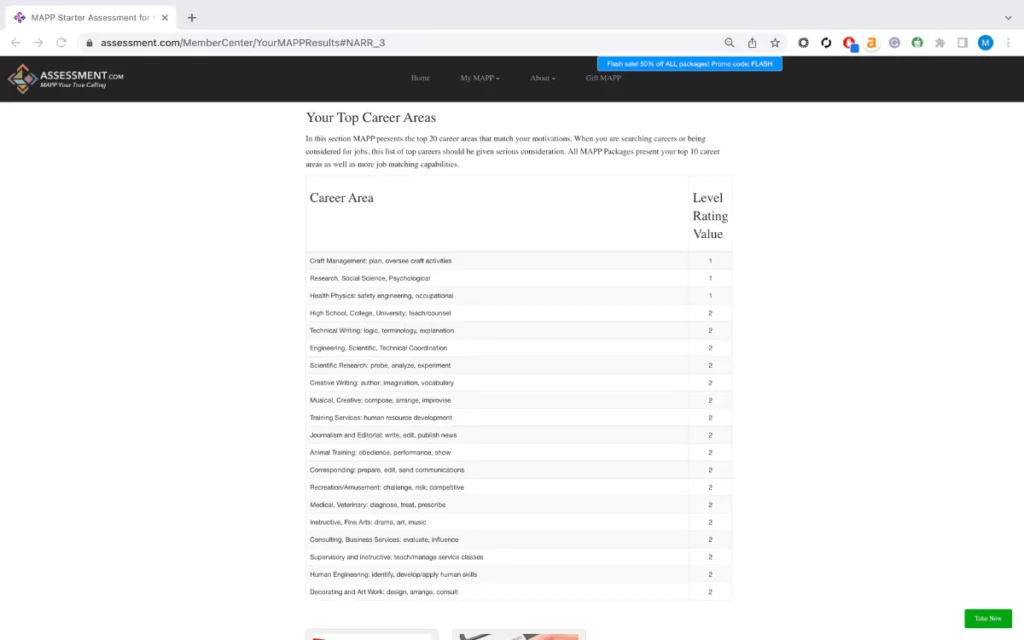
Post-Test Support and Resources
Besides the written report, I received a chart of my top twenty career areas grouped into broad categories and a generic six-step career planning guide. However, I didn’t receive personalized career recommendations. For an extra $30, I could access twenty career matches, and $60 will buy the latter, a longer report, and a personalized resume.
Additionally, I can access the MAPP career database with the starter package, which allows me to research my compatibility with various career categories, such as business, sales, or healthcare. Or, I can search careers by keyword for additional information and compatibility scores. While these are nice perks, they feel cheap, considering the test normally costs just shy of $100.
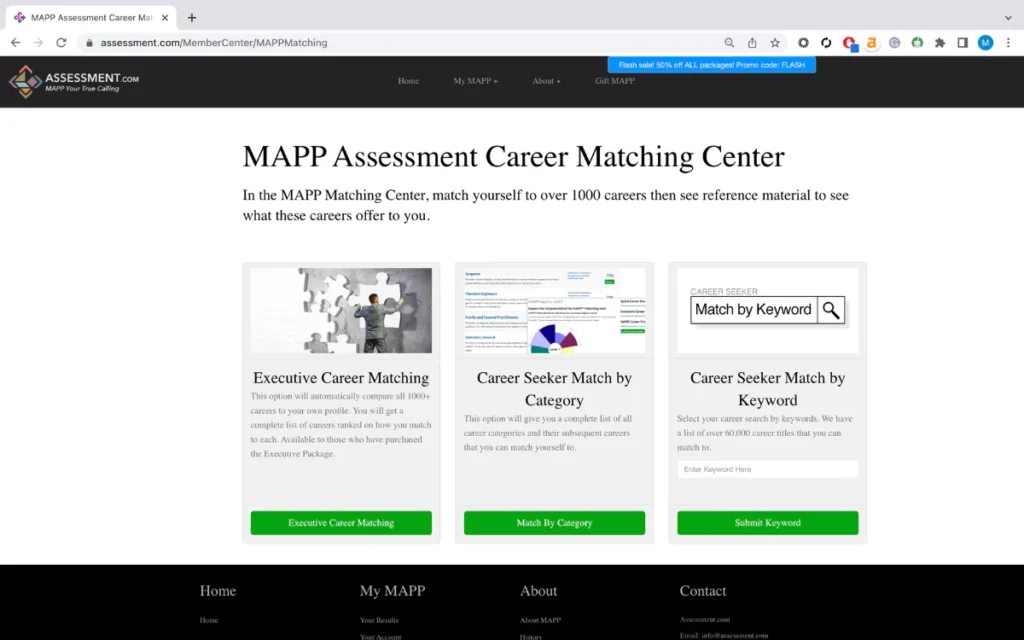
Should You Try the MAPP Assessment?
From my experience, the MAPP assessment didn’t live up to the hype. While I learned a few things about myself, conversing with a good friend or career counselor can provide similar results. And for $80, I was expecting a more robust report with better graphics, usability, and personalized career recommendations.
While you should use several sources of inspiration throughout your career search, I recommend trying JobTest.org, which uses current career statistics, AI and machine learning, and personalized reporting. Not only is JobTest.org a better career test for the value, but it gives more relevant feedback in understandable language, plus resources to aid your career journey.
| JobTest.org | MAPP | |
|---|---|---|
| Work Personality Assessment | ||
| Career Recommendations | ||
| Personalized Feedback | ||
| Industry Expertise | ||
| Work Environment Matching | ||
| User Experience | ||
| Multiple Languages | ||
| Post-Test Resources | ||
| Career Change Assistance | ||
| Dedicated Customer Support | ||
| Learn More | Learn More |
After working in last-mile logistics, Miles transitioned to a career as a content developer and editor, contributing to various digital publications. He frequently writes about topics concerning nutrition, health, education, and career development, among others. When away from his keyboard, Miles enjoys delving into works related to artificial intelligence and metaphysics, stemming from his studies as a philosophy major at the University of Tampa. You can also find Miles spending time with his dog, Biggie, or experimenting with a new recipe at home with friends and family.






